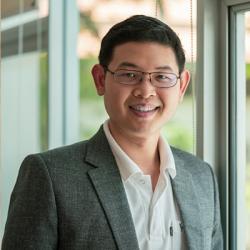
PhD (2019)
Thanyaporn is a lecturer at the College of Interdisciplinary Studies, Thammasat University in Thailand. He obtained his PhD in Business from CBE’s Research School of Management in 2019. His research was awarded Best Paper at the Academy of International Business (AIB) Southeast Asia region conference in 2017. Thanyaporn was also a finalist for the Alan Rugman Young Scholar Award and the Best Paper Award on Emerging Economies Research at AIB’s 2018 conference. He leads consultancy projects for public and government organisations in Thailand and a recent article of his appeared in Management International Review.
20 AUGUST 2021
What is your current position and affiliation?
Upon graduating, I resumed my job as a lecturer at College of Interdisciplinary Studies, Thammasat University. I am currently Program Coordinator for their online MBA (Business Innovation) and was recently appointed Assistant Rector for Student Affairs. Both of these roles are also at Thammasat University. Previously, I worked as Deputy Director at Thammasat Institute of Area Studies and Program Director for Master of Arts in Asia-Pacific Studies.
From you experience, what are some of the opportunities and challenges of working in academia?
Working in academia is very stimulating as you get to engage with new initiatives and ideas. As an academic, you may be approached to work on new projects run by universities or international academic communities. For me, I have been involved with some initiatives at my university, including the Thammasat Frontier School, TUXSA online MBA program, Thammasat Hackathon, Entrepreneurial Learning Space, and others. An academic’s expertise will also be sought by people in private and government sectors; they want to share the problems their organisations are facing and hire you to help. However, as we are in academia, we have to balance consulting work, commissioned research and academic research, and it is challenging to maintain a high level of productivity on all sides.
What are your top survival tips for early career academics?
You will be very busy when you start your career in academia. It is almost impossible to keep the good habits you developed during your PhD studies. Firstly, make sure you understand the requirements to pass performance appraisal. Secondly, remember that PhD supervisors are lifetime mentors. Finally, it is important that early career academics work on their personal branding so people know your research and can see how they may collaborate with you.
How do you discover new research ideas and develop your research network?
Attending conferences enables me to network with senior scholars from my field. In addition to this, talking with people such as students, companies and government agencies, helps me identify interesting phenomenon that sparks my interest and joy. However, the second approach does not always turn into a good research question.
What are some things you wish you had known during your PhD that may be helpful in your academic career?
Some things I wish I had known during my PhD include:
- how to write a response letter to reviewers and editors
- technology that helps capture data in real settings
- more about experimental research design.
Reflecting on your time as a PhD student, how did you work productively with your supervisors?
I found making summary notes right after supervisory meetings useful. They included details on what to do before the next meeting. Agreeing with supervisors on targeted conferences and journal outlets early helped me plan ahead, as there were many pressing deadlines. I also think trying to advance data analysis skills early gives one an advantage.
